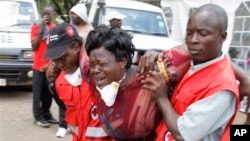Despite military offensives against al Shabab and drone strikes by the U.S., the Somali militant group continues to survive. But one analyst thinks it may be changing, as well.
Bronwyn Bruton is deputy director of the Africa Center at The Atlantic Council. The Washington-based think tank focuses on security amid political and economic change. Bruton said last week’s attack at Garissa University in Kenya marks a turning point. She said it may be evidence of an African jihadist movement.
Bruton wrote an analysis entitled Al Shabab Crosses the Rubicon – a reference to strategic move by Julius Caesar. “Crossing the Rubicon” is an idiom often meaning reaching a point of no return. Caesar, a Roman general at the time, had his army cross the river in 49 B.C. and march to Rome. Roman generals usually kept their armies outside of the capital so they would not be viewed as a threat.
“It’s important to understand with this attack al Shabab, I believe, is signaling a real change in strategy. Throughout their history they’ve been a big tent movement. Their origins in Somalia were as a national uprising against the Ethiopian and African Union troops. They were dedicated to overthrowing the Western-backed government. And for that reason they had a real populist set of objectives for a long time,” she said.
Bruton said the loss of territory in Somalia to government and AU troops has caused al Shabab to change its focus.
“They no longer have a reason to pursue populist objectives. They’re really a pure terrorist group at this point. They don’t control territory. They don’t have to worry about governing. They don’t have to worry about co-existing with Somalia’s clans or whether or not to allow humanitarian relief. They really are just an organization that’s dedicated to terror,” she said.
Bruton said the attack on the university made that even clearer than the assault on Kenya’s Westgate Mall. Al Shabab had been linked to al Qaeda, but now is associated with the Islamic State, which may have more to offer.
The Atlantic Council analyst said that “it’s really unfortunate that over the years the U.S. chose not to engage with al Shabab inside Somalia because although President Obama and others are fond of calling Somalia a success I don’t see the success there.”
She said the militant group had two factions. One was a made up of clan leaders opposed to the government and the other was a group of “foreign oriented terrorist types.” Bruton said the latter group has gone to Kenya “where they’re wreaking terrible havoc on the population.”
She said that al Shabab may be much “harder to root out” in Kenya because foreigners blend in more easily there compared to Somalia. And she said Kenya security forces have done a poor job protecting the population. In fact, she said, many fear the security forces and are less likely to report suspicious people or activity as a result.
As for U.S. drone strikes in Somalia against al Shabab leaders, Bruton said that “al Shabab has proven time and time again that [it] can’t really be decapitated. Every time we turn around there’s a new high value target, whose name hasn’t really been circulating that much. So, there seems to be an almost endless flow of expertise to Somalia from various quarters, most of them from al Qaeda linkages.”
Bruton added that with the resilience of al Shabab and the death and destruction wrought by Nigeria’s Boko Harem militants she’s “more and more concerned that we are coming up with a sort of authentically African jihadist narrative and jihadist movement. And I think it’s a really frightening development.”
To hear the full interview with VOA’s Joe De Capua click on the link below.





